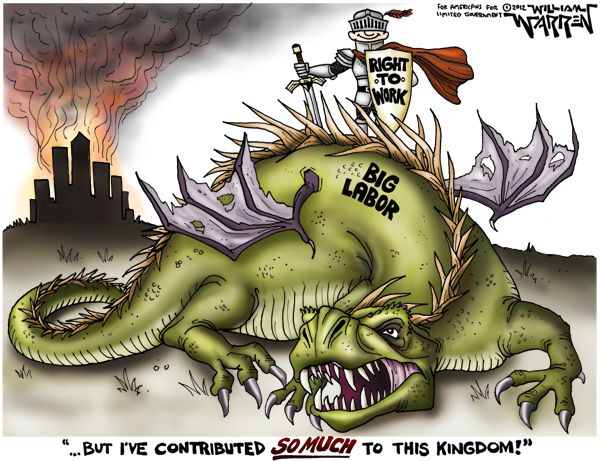By a 5-4 vote, the Supreme Court ruled in the Janus case that government workers cannot be forced to pay unions just to keep their jobs. This is a huge victory for public employees – and likely for taxpayers as well. Functionally, the Janus v. American Federation of State, County and Municipal Employees decision is like passing a Right to Work law for government workers. From now on, unions will need to continually demonstrate their value to workers and will likely need to scale back their political involvement, or at least adjust their politics to be less partisan.
In its ruling, the Court recognized the freedom of speech rights of government workers. All public employees will now have the right to opt-out of paying unions to lobby for things the employees oppose. Previously, all federal workers, as well as state and local government workers covered by Right to Work laws, had this right; now the rights of state and local government employees who were not already covered by Right to Work laws have been affirmed as well.
Quoting the majority opinion by Justice Samuel Alito, “Compelling individuals to mouth support for views they find objectionable violates that cardinal constitutional command, and in most contexts, any such effort would be universally condemned.”
After years of being neglected, union members are starting to see changes and may soon see even more as a result of this case. One of the changes that workers have already seen is that unions have developed a new sense of urgency toward reaching out to their members. Based on the record of Right to Work states, other changes that could occur include lower union dues and less extravagant compensation for public union bosses.
Not only is this ruling a win for government workers, it is also likely to be a win for taxpayers. Government unions are some of the biggest funders of liberal politicians who support high taxes and bigger government. With their massive war chests, public employee unions have wielded an inordinate amount of power in setting public policy. For example, they have successfully lobbied for overly-generous pensions that have strained the budgets of states and localities from coast to coast. As these unions see their membership shrink and are forced to focus on serving their members, some of whom are moderate or conservative, they are likely to alter their political spending habits. Furthermore, a 2017 study found that funding and support for Democrat candidates declined after the passage of Right to Work laws, and the Janus decision could have a similar effect.
Now that the Court has curbed the power of government unions, there are several further steps that the federal government, as well as local and state governments, should take to help restore the proper balance of power between public sector unions and taxpayers.
- Governments should launch information campaigns to ensure that all public employees know they have the right to opt out of paying union dues or fees.
- Governments should switch from an opt-out system to an opt-in system for paying union dues – the same system employees use to authorize payroll deductions for the United Way or insurance.
- Governments should stop allowing their employees to conduct union business on government time. After all, public employees are hired to serve the public, not private labor organizations.
The Supreme Court has delivered an important victory for government workers, and the repercussions are likely to be beneficial to taxpayers. As unions are forced to pay attention to the wishes of their members and are likely forced to tighten their belts due to declining membership, there should be fewer resources available to push Big Government agendas. The federal, state, and local governments should take further action to shift power away from public sector unions and back toward the taxpayers that they are supposed to serve by running informational campaigns to ensure public employees know they can opt out of unions; by changing from a system that requires workers to opt-out of paying unions to one that requires union members to opt-in to pay dues; and by prohibiting government workers from working on union business on government time.
Richard McCarty is the Director of Research at Americans for Limited Government Foundation.







